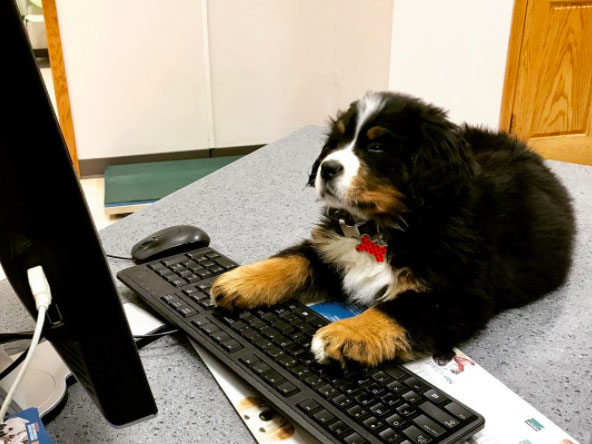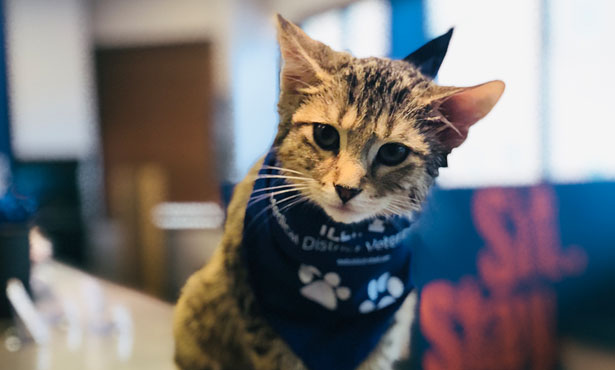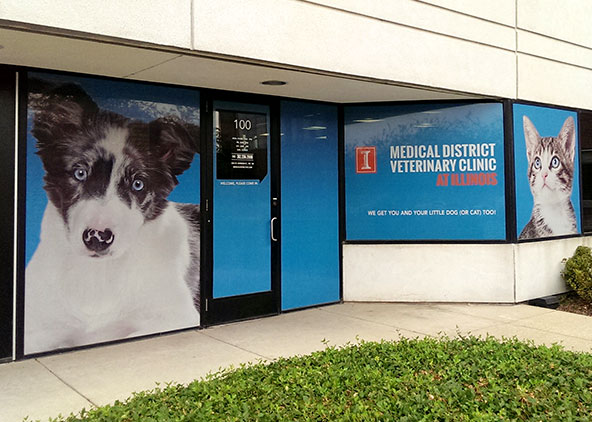Posts in Category: Clinic Updates
National Bring Your Cat to the Vet Day
August 22 is National Bring Your Cat to the Vet Day, which is the purr-fect opportunity to schedule your cat’s routine check-up with us.
Around 83% of cats visit the veterinarian before their first birthday, but more than half don’t return until they become sick or are in pain. When we see our feline patients more regularly, we can positively affect their long-term health by detecting health concerns sooner.
Below are key reasons why it is important to bring your cat for an annual exam:
Cats Age Very Quickly Compared to Humans
A cat reaches the human age of 15 during its first year, and 24 by its second year. Each year after, your cat ages approximately 4 “human years” for every calendar year. Therefore, annual veterinary care is crucial because a lot can happen in 4 years.
Cats Are Masters of Hiding Illness and Pain
Your cat could be developing a health condition long before you notice anything is wrong. You may not recognize some behavior changes as being significant, but subtle or minor changes may help to uncover hidden issues. It is very important for us to see your cats on a regular basis because we are trained to detect a problem before it advances or becomes more difficult to treat.
Obesity
Over half of all cats are overweight or obese. We like to check your cat’s weight at each visit and provide recommendations to help keep your cat at its ideal weight. A few extra pounds can put your cat at risk for conditions such as diabetes, heart, respiratory, joint, and kidney disease.
Dental Disease
Adult cats have 30 teeth, which equates to a lot of dental care! Periodontal disease is considered the most prevalent disease in cats three years of age and older, and often there are no obvious signs of dental disease.
Most cats with dental disease still eat without a noticeable change in appetite, so it is very important perform routine oral examinations before the disease has progressed to the point of obvious illness.
Preventative Care Is Better Than Reactive Care
Information discussed, along with a thorough physical exam, allows us to create a plan to help your cat remain healthy. Regular exams can help avoid medical emergencies since we can often detect conditions or diseases long before they become significant, painful, or more costly to treat.
Please visit www.catvets.com/cat2vetday for more valuable tips on how to reduce stress during veterinary visits and make the visit as pleasant as possible for your cat.
Amber Slaughter, DVM
Medical District Veterinary Clinic
Pictured above: Anastasia, 15 weeks old, recently came to see us for her first vet visit.
Veterinary Technicians, Connect with Us!
Are you ready to put your clinical skills, communication skills, and caring into practice at a clinic committed to delivering the best veterinary service? The University of Illinois Medical District Veterinary Clinic in Chicago seeks a veterinary technician to be part of our patient-centered, client-focused team.
This full-time (37.5-hour week), civil-service (contract) position requires successful completion of a veterinary technology program accredited by the American Veterinary Medical Association (veterinary technician – general) or one year of professional experience and certification as veterinary technician by the Illinois Department of Financial and Professional Regulation. The University of Illinois offers generous vacation and sick leave benefits.
View classification specifications:
https://www.sucss.illinois.gov/documents/ClassSpecs/htm/spec4080.htm
Please submit a cover letter, resume and contact information for three references to:
Keri Dean
Veterinary Medicine HR
keridean@illinois.edu
(217) 244-9271
The University of Illinois conducts criminal background checks on all job candidates upon acceptance of a written contingent offer.
Illinois is an Affirmative Action/Equal Opportunity Employer and welcomes individuals with diverse backgrounds, experiences, and ideas who embrace and value diversity and inclusivity (inclusiveillinois.illinois.edu).
Holiday 2017 Schedule Changes
Note these changes when scheduling your next appointment
With holiday season upon us, we wish everyone some quality time with friends and family, as well as a little R&R. The Medical District Veterinary Clinic will have some extra days off and reduced hours. (Please note that we are also closed on Sundays.) Here is our holiday schedule:
Thanksgiving Break
Closed: Thursday, Nov. 23, and Friday, Nov. 24.
We will resume normal hours on Saturday, Nov. 25.
Christmas Break
Closed: Monday, Dec. 25, and Tuesday, Dec. 26.
Reduced hours: We will be open 9 a.m.-5 p.m. on Wednesday, Dec. 27, Thursday, Dec. 28, and Friday, Dec. 29.
New Year’s Day
Closed: Monday, Jan. 1
We will resume normal hours on Tuesday, Jan. 2.
Join Our Team: Office Administrator Position Open

Work for an amazing clinic that has a close bond with its patients and clients. (Just see all of our positive reviews on Facebook and Yelp!) The University of Illinois Medical District Veterinary Clinic in Chicago seeks an Office Administrator to provide administrative support and assistance to the Director of the Medical District Veterinary Clinic and College of Veterinary Medicine finance staff.
This position requires a high school diploma and four years of progressively responsible experience in an office support setting that requires the use of judgment and initiative, and the ability to operate computer systems utilizing various office software packages, OR two years providing specialized support regarding programs, policies and procedures related to the work of the principal(s).
View classification specifications: https://www.sucss.illinois.gov/specs/detail.aspx?ID=2812&osm=c19
Please submit a cover letter, resume and contact information for three references to:
Keri Dean
Veterinary Medicine HR
keridean@illinois.edu
(217) 244-9271
The University of Illinois conducts criminal background checks on all job candidates upon acceptance of a written contingent offer.
Illinois is an Affirmative Action/Equal Opportunity Employer and welcomes individuals with diverse backgrounds, experiences, and ideas who embrace and value diversity and inclusivity (inclusiveillinois.illinois.edu).
Medical District Veterinary Clinic Is Growing
Dear Friends,
As some of you may have heard, as of December 9, Veterinary Specialty Center will no longer be providing emergency and specialty services at the location next door to Medical District Veterinary Clinic.
While we have enjoyed a working relationship with VSC at Illinois over the past four years, the change does allow us to focus completely on the health and wellness needs of our primary care patients and their families.
Within the next month we will be adding a third doctor, Dr. Amber Slaughter. Dr. Slaughter is originally from Oak Park, but is currently practicing in Seattle, Wash. We are excited that she will be moving back to Chicago and joining our team.
The addition of Dr. Slaughter will allow us to have more available appointments, and we will be exploring the possibility of extended hours. We will let you know very soon what our recommendation will be for our clients who need afterhours care for their pets.
We thank you for your loyalty to Medical District Veterinary Clinic and the University of Illinois College of Veterinary Medicine. We promise to continue to serve you and your pets with the highest level of care and compassion.
If you have any questions regarding this change, please don’t hesitate to give us a call.
Sincerely,
Dr. Drew Sullivan and Dr. Brett Grossman
Thank You, Vet Techs!
Veterinary technicians are vital to our practice and to the care of your pets. If we were to compare a veterinary technician to a position in the human medicine field, they play a role very similar to a registered nurse (RN). October 16-22 was National Veterinary Technician Week. I would like to let our clients know how much we appreciate all our technicians do for us.
The following is a short list of the many duties they perform: providing client education on wellness care, behavior recommendations, nutritional recommendations, preparing animals for exams or surgery, monitoring animals during surgery, collecting lab samples, running laboratory test, taking X-rays, administering medications and vaccines, and maintaining patient records.
Here at Medical District Veterinary Clinic we are fortunate to have six certified veterinary technicians on staff. Thank you to our amazing team: Candace Crawford, Kelsie Dolezal, Alexandra Garcia, Kyleen Linsemeyer, Crystal Redinger, and Priscilla Wegrzyn. Next time you are in let them know how much you appreciate them—this clinic would not be the same without them. See our profiles of them on our Facebook page.
Drew Sullivan, DVM, Director
Medical District Veterinary Clinic
Resident Caterpillars Aid in Monarch Butterfly Conservation
We are excited to introduce you to our two monarch caterpillars on display, Logan and Pilsen! This fall, Veterinary Behavior at Illinois and Medical District Veterinary Clinic at Illinois are teaming up to promote the conservation of one of our favorite insects—the monarch butterfly.
 This captivating insect is not only a beautiful summer guest of Midwestern fields and gardens, it is also an international traveler. Every year several generations of monarchs will reproduce and live their two- to three-month lifespans in the Midwestern U.S. and Canada, and every fall the fifth generation will travel 1,500 miles south to Central Mexico. This migratory generation lives a total of eight to nine months and spends the winter in the pine forests of central Mexico, then travels back to the southern U.S. to reproduce and lay eggs. Their offspring then head further north and the cycle repeats.
This captivating insect is not only a beautiful summer guest of Midwestern fields and gardens, it is also an international traveler. Every year several generations of monarchs will reproduce and live their two- to three-month lifespans in the Midwestern U.S. and Canada, and every fall the fifth generation will travel 1,500 miles south to Central Mexico. This migratory generation lives a total of eight to nine months and spends the winter in the pine forests of central Mexico, then travels back to the southern U.S. to reproduce and lay eggs. Their offspring then head further north and the cycle repeats.
While adult monarch butterflies will feed off of various species of flowers, the monarch caterpillar will only eat one type of plant—the milkweed. Unfortunately, habitat loss due to development and agricultural practices in the U.S. has eliminated large tracts of milkweed and resulted in a decline in the monarch butterfly population. Compounding the problem, deforestation has destroyed several of the monarch’s overwintering sites in Mexico, so fewer butterflies make the journey back to the U.S. to reproduce each spring. Our Midwestern population of monarch butterflies is now severely threatened.
Fortunately, there are many ways we can all help the monarch butterflies:
 Plant the monarch’s host plant, the milkweed. The more milkweed available, the more monarchs will reach adulthood. There are several species of milkweed and attractive options for the home garden are the swamp milkweed, butterfly weed, and whorled milkweed.
Plant the monarch’s host plant, the milkweed. The more milkweed available, the more monarchs will reach adulthood. There are several species of milkweed and attractive options for the home garden are the swamp milkweed, butterfly weed, and whorled milkweed.- Plant nectar plants for adult monarch caterpillars. They need plenty of nectar to reproduce and make their long journey south. Favorites of monarchs include Echinacea, Liatris, and Solidago (Goldenrod).
- Collect and raise monarch caterpillars indoors. While only 1 in 10 eggs will survive to adulthood outdoors due to predation, 9 in 10 eggs raised indoors will survive to adulthood. To successfully raise monarch caterpillars you will need plenty of milkweed, as these caterpillars are hungry! Monarch Watch offers excellent tips to help you get started rearing monarchs.
If you would like to learn more or are interested in visiting our caterpillars, Logan and Pilsen, please stop by our clinic.
Kelly Ballantyne, DVM, DACVB
Veterinary Behavior at Illinois
LATEST UPDATE ON CANINE INFLUENZA
In recent weeks there has been an increased surge of coughing dogs in Chicago. We had been free of suspected flu cases for well over a month here at Medical District Veterinary Clinic at Illinois. But two weeks ago, we had one confirmed case followed immediately by six subsequent cases that were highly suspicious of the canine flu. All of these dogs have had a common history of frequenting day care, boarding facilities, or dog parks. We are still continuing to recommend using caution in these areas to help protect your dog, since there is not yet a vaccine that protects against the effecting H3N2 strain.
Most cases have started with either mild coughing or sneezing, which eventually has progressed to a loud, honking cough. Some pets have a decreased appetite, depression, and fever. If your pet is showing any of these signs, please have your pet examined as soon as possible for time is of the essence to prevent these cases from progressing to life-threatening pneumonia.
Dogs at highest risk of exposure include those that socialize with other dogs by attending day care, boarding or grooming, dog parks, and those that live in high-density enclosed areas, such as high-rise buildings. We recommend owners decrease the risks of exposure by trying to avoid these high-risk areas as much as possible. Canine Influenza Virus can survive 48 hours on hard surfaces and 24 hours on clothing, thus it is very important to also be cautious in elevators, hallways, and places where dogs congregate, like dog relief stations or community dog bowls.
Please call Medical District Veterinary Clinic with any questions at (312) 226-2588.
NEW UPDATE ON CANINE INFLUENZA OUTBREAK
 The recent canine influenza outbreak in Chicago is caused by a different strain of the virus than was earlier assumed. According to laboratory scientists at Cornell University and the University of Wisconsin, the outbreak is caused by a virus related to Asian strains of influenza A H3N2 viruses—not the H3N8 strain. Both strains can cause high fever, loss of appetite, coughing, nasal discharge, and lethargy. Symptoms may be more severe with the H3N2 virus. H3N2 has also caused infection and respiratory illness in cats.
The recent canine influenza outbreak in Chicago is caused by a different strain of the virus than was earlier assumed. According to laboratory scientists at Cornell University and the University of Wisconsin, the outbreak is caused by a virus related to Asian strains of influenza A H3N2 viruses—not the H3N8 strain. Both strains can cause high fever, loss of appetite, coughing, nasal discharge, and lethargy. Symptoms may be more severe with the H3N2 virus. H3N2 has also caused infection and respiratory illness in cats.
IMPORTANT UPDATE: Chicago Kennel Cough Outbreak
 In recent weeks we have seen a large number of coughing dogs here in Chicago. Most of the affected dogs have a history of frequenting day care, boarding facilities, and dog parks. At this time I recommend avoiding these facilities to help protect your dog, even if he/she has been vaccinated for “canine cough.”
In recent weeks we have seen a large number of coughing dogs here in Chicago. Most of the affected dogs have a history of frequenting day care, boarding facilities, and dog parks. At this time I recommend avoiding these facilities to help protect your dog, even if he/she has been vaccinated for “canine cough.”
Why isn’t vaccination sufficient protection? Let me explain a little about canine cough.
“Canine cough” (also called “kennel cough”) is a broad term to describe infectious tracheobronchitis. This highly contagious condition results in inflammation of the trachea and bronchus. Many viruses and bacteria can result in canine cough. Currently the intra-nasal vaccine recommended for dogs here at the Medical District Veterinary Clinic covers the three most common causes of canine cough: Bordetella (bacteria), Parainfluenza (virus), and Adenovirus (virus).
However, early test results from patients in this outbreak point to an underlying culprit of canine influenza (flu). There is a vaccine for canine influenza on the market, but it has not been widely used or recommended because of the low risk of canine influenza.
Most cases start with a mild cough, which eventually progresses to a loud, honking cough. Some pets have decreased appetite, depression, and fever. We have seen a number of dogs develop a secondary pneumonia. If your pet is showing any of these signs, please have your pet seen.
Due to the outbreak I recommend avoiding any direct dog-to-dog contact and vaccinating dogs at high risk, such as those that attend day care, boarding, grooming, or dog parks and dogs that live in high rises. Although the vaccine does not 100% prevent infection, it should reduce the number of affected dogs. The canine influenza virus can survive 48 hours on hard surfaces and 24 hours on clothing, thus it is very important to be cautious in elevators, hallways, and dog relief stations.
Dogs need a booster two to four weeks after the initial vaccination. Dogs are not considered protected until 14 days after the second vaccine. The vaccination lasts one year and must be given annually thereafter. We do not recommend vaccinating dogs that have been infected until at least four weeks after the infection has cleared. Not all dogs may need the vaccine.
Please call the Medical District Veterinary Clinic at Illinois with any questions: 312-226-2588.


![[tech connecting with puppy patient]](https://www.medicaldistrictvet.com/blog/wp-content/uploads/2017/11/connect.jpg)



